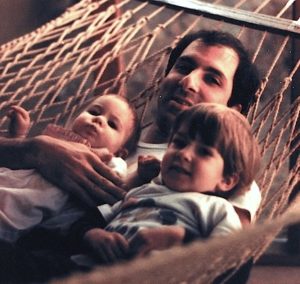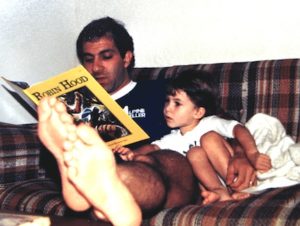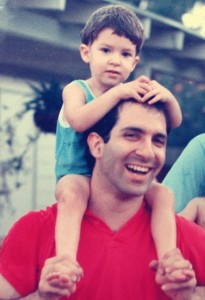 |
| Steve with Becky and John in a hammock at a friend’s cabin in 1985 |
A Bonus Chapter from the book The MoneySmart Family System.
Dads, it’s just you and me (Steve) here. I don’t know your background or what you’re wrestling with right now, but I do know what you are capable of when you put your mind to it. I’ve been a dad for more than 30 years and I would like to say that I did my job as a dad flawlessly . . . but I can’t. I’ve made mistakes—many of them, but in the midst of the mistakes, I’ve grabbed some great gold nuggets of wisdom and made some life changes that I’d like to share with you. I’m hoping that you might be able to make something good out of my pain.
I don’t want to be a “macho man” dad or an “I’m always right dad” or a “work-a-holic” dad. These aren’t the kind of dads who lead MoneySmart families.
A MoneySmart dad is one who’s in there for the long haul, starting with poopy diapers (I gagged) all the way through the college years (I gasped at the costs). A real dad is there physically and mentally for his kids and his wife. Now, I know that some of you do a lot of traveling or are in the military, and the “physically being there” part is tough, but you can still be there mentally, and with the help of technology you can communicate. My biggest failures, in the past 30 years, occurred when I became distracted and forgot what my job as a real husband and real dad was.
To help me remember I’ve carried a sheet of paper in my datebook since 1999 to remind me of why I’m here. It says:
My Job Description
 |
| Daddy plaque made by Abbey when she was 5 years old. |
I used to think that my job was to bring home a bigger and bigger paycheck.
But over the years I’ve come to realize that:
- It’s not the size of the paycheck that really matters.
- It’s not the stuff we buy, drive, or wear that makes life worth living.
- It is spending time with Annette, helping her, and making her life less stressful.
- It’s knowing my kids’ dreams and working with them to fulfill them.
My real job is helping my wife and kids reach their goals.
Take the Kids & Money Quiz
Find out if your child become financially independent
Eight nuggets from the hard times.
Gold Nugget 1: A Dad / Husband needs to be there in the crisis. My family is my life, my job isn’t.
When I worked as an advertising account executive, at times I’d be juggling 30 or 40 different job deadlines. I was making good money and satisfying my clients’ demands, but they’d become more important than my family.
My most shameful day as a dad occurred when Annette called while I was supervising a photoshoot for one client while working on a huge quote for another. She was panicked. She had taken the kids to a park with several other families. While there John, our oldest son, jumped his bike and crashed. He broke his collarbone and she needed me to go to the hospital so she could take the other kids home. I told her I was in the middle of two important deadlines. I asked her to find someone else to take the kids home so she could go to the hospital while I got home as quickly as I could to be with the kids.
What a moron I was. I had been the one to do the emergency room trip with every one of our kids in the past—Annette simply doesn’t do well in these situations. I totally abandoned her.
Would my client have understood if the quote was late? Certainly. Could a different art director have overseen the photoshoot? Without a doubt.
It took years to restore the broken trust with Annette from that one, split-second decision. That incident was indicative of my faulty thinking—I thought that my job was my primary responsibility in providing for our family. A painful, but valuable lesson.
Gold Nugget 2: Being available is more valuable than a huge paycheck.
I resented the fact that Annette wanted me home for dinner, my dad had rarely done that, and I didn’t see value in it. Surely she could handle taking care of five kids all day, cook the meal and then sit down and supervise them until I arrived home . . . right?
Wrong! I needed to be there, and once I realized how important it was to Annette and the kids, I started looking for a job closer to home. I calculated that in the 11 years I worked my last graphics job, I’d spent 3475 hours driving to and from work (30 minutes going and 45 minutes coming home)—the equivalent of 87 forty-hour workweeks (2 years of time) in the car!
Eventually, I found a job that paid less but was one mile from home. I could come home for lunch and ride a bike to work. When we had a water leak the day before a hosting a holiday party, I rushed home and turned the water main off before the house was flooded.
Because we had no debt and managed our money with a great budgeting system, we could take a 50 percent cut in pay and still be okay. Annette and the kids were ecstatic that they could come to the office for lunch, and I could arrive home in 5 minutes.
If you’re offered a new job, consider how the new position will affect your family, not just how much more you’ll earn.
As a dad, I realized that my family needed me more than all of the frills that money could buy. By shopping smarter and planning better, we learned to live well on less.
Gold Nugget 3: I’m the Coach—I want to lead my family to victory!
Have you ever been home physically, but not really there mentally? A winning coach has got to be 100 percent in the game—he can’t walk the sidelines and allow his mind wander. As a dad, I’ve got to focus on my family, 100 percent. Our real job starts in the car, on the drive home, 15 minutes before we walk in the door. We may be dead tired and mentally spent from work, but as the coach, we can’t show it. We’ve got to be ready to lead our team.
Too often I bullied Annette into believing that my job was so stressful that she shouldn’t approach me with problems until I had time to relax. That’s a bunch of bull. If I’m the coach and I want my team to win a championship, they’ve got to be able to come to me anytime with problems so we can work together to solve them.
As a former collegiate athlete, I know the value of working out. I took care of my body with exercise, but I didn’t help my wife and kids get exercise. In 2005 I finally figured it out, canceled my gym membership and started walking several miles each morning at a nearby park. Within a few months I had some of the kids involved, then eventually Annette joined us. The next year we found a place where we could weight train as a family for free. Becky and I started going there, and then eventually the whole family started going. I was slow to figure it out, but now we’re all stronger, healthier and happier.
Gold Nugget 4: I’m an Encourager, not a Critic
Most dads, myself included, can clearly see everyone else’s problems (but not their own). Unfortunately, I not only saw the problems, but I was quick to point them out to my kids and my wife. A great coach sees problems too, but he knows that athletes need to be encouraged and then trained to overcome shortcomings. They also know that learning new skills takes time.
I went to a soccer-coaching clinic when John was about 10 years old. After the leader taught us several new drills he said something that really stuck, “Don’t expect to see your team use these skills in a game for at least one year.” He explained that doing a skill during practice was easier because the kids anticipated what to do. In a game, the skill has to be so ingrained that they simply react to a situation without thinking.
As a dad, we need to constantly encourage our kids, gently correct and patiently re-train until they truly learn a new habit. Then we need to cheer when they get it right. It really doesn’t matter what the “problem” is: sibling rivalries, making a bed, doing homework, tantrums, saving money—we need to be a calm, patient coach, not a cruel, pouncing critic.
Look for the good things they do and encourage them again and again.
Gold Nugget 5: Give hugs not slugs

Kids need physical affirmation. I didn’t grow up in a cuddly, touchy-feely family, but Annette did. I needed to learn to be soft and snuggly with her and the kids. Hugs do more to break down barriers and open communication than the “slugs” of criticism or discipline. Kids need hugs—even teens!
Gold Nugget 6: Use “drive time” to learn
I am a slow reader, but I love gaining wisdom and finding solutions. Years ago I discovered audiobooks and have listened to thousands of them while I drove. I listened to everything; fiction, non-fiction, classics, business, parenting, and marriage books. I’ve picked up some great ideas for our kids, our home, and our marriage by taking drive time and turning it into classroom time. Now I also listen to podcasts and audiobooks while I exercise or do yard work.
Gold Nugget 7: Be an example: Live Small, Live Free!
We don’t use credit cards or have a car payment. We simply hate debt. By keeping our overhead low, we’ve eliminated the pressure to have to work more hours or a second job. Living a smaller lifestyle allows us to pour more time into our kids and each other. Do whatever it takes to reduce your monthly obligations. You’ll prove to your kids that living within your means produces financial freedom. Show them how you look for deals, negotiate, and write things on a wish list. Be an example.
Gold Nugget 8: Admit it: Be humble or be humbled
We’re all going to make mistakes. It’s far better to be transparent and admit your mistakes quickly and humbly than to pretend they didn’t happen. This is especially important for our kids.
When I “find my temper,” and get angry with our kids or Annette, I need to go and admit that I was wrong. If I don’t, they’ll learn that they can blow up and not apologize too. Too many times I’ve blamed Annette or the kids for doing something that made me mad when the truth is that I chose to respond out of anger, frustration or hurt instead of trying to understand their concerns or hurts. Dads, we have to have soft hearts and be willing to admit when we’ve made mistakes. Humility breeds humility.
Let’s create a new stereotype of how a MoneySmart Dad leads his family. A MoneySmart Dad knows he isn’t perfect. But he is a perfect example of an imperfect (but improving), gentle, caring, and humble man. He’s there for his wife and kids—coaching, encouraging, and leading them to be the best they can possibly be, in their education, their finances, their jobs, and their relationships.
Dad, be 100 percent there—your family desperately needs you. Your influence will impact your kids. Your kids will impact their friends. Their friends will impact their generation. And their generation will change the world!
 |
| John-John riding on Steve’s Shoulders in 1985 |
 |
| Economides Family 2012: left to right: back row: Annette, Steve, Joe, John and Rachel (daughter-in-law); Front row: Abbey and Becky (Roy is not pictured- he was living in Texas at the time of the photo). |
